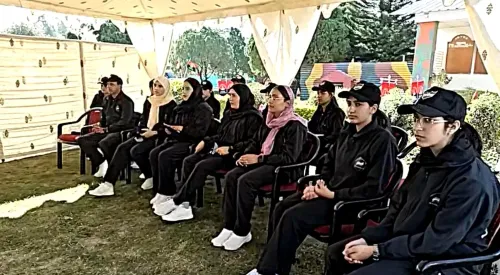Why Was Guwahati's IIHM Campus Demolished?

Synopsis
Key Takeaways
- Guwahati Metropolitan Development Authority is taking steps to reclaim wetlands.
- The eviction drive targets ecologically sensitive areas to combat urban flooding.
- Legal protocols were followed during the demolition process.
- Environmentalists support the initiative for protecting natural water bodies.
- Recent eviction drives in Assam have faced resistance and led to violence.
Guwahati, July 21 (NationPress) The Guwahati Metropolitan Development Authority (GMDA) took action on Monday to demolish the campus of the Indian Institute of Hotel Management (IIHM) located in the Cachal area of the city. This was part of their ongoing eviction initiative aimed at the ecologically sensitive Silsako Beel, according to officials.
This action is part of a broader strategy by the Assam government to reclaim the wetland, a site that has faced years of encroachment from individuals, private entities, and even governmental organizations.
Officials have pointed out that the unchecked encroachment of Silsako Beel has significantly contributed to the increasing urban flooding in Guwahati, especially during the monsoon period.
Assam Housing and Urban Affairs Minister Jayanta Mallabaruah defended the demolition by stating, "Guwahati possesses a substantial wetland known as Silsako. Unfortunately, this area has been encroached upon by the public, institutions, and even government bodies. The demolition initiative is aimed at resolving the urban flooding issues in Guwahati."
The eviction campaign, which has garnered strong support from the state administration, aims to restore the city’s natural drainage systems and tackle its ongoing waterlogging problems.
In recent months, a number of residential and commercial structures have been dismantled as part of this initiative.
Authorities assert that all legal protocols were adhered to, with notices provided to occupants well in advance. The actions taken were in accordance with the directives of the Gauhati High Court, which has emphasized the importance of preserving and restoring the wetland.
The GMDA has confirmed that the eviction efforts will progress in phases throughout the larger Silsako Beel area.
Environmentalists and urban planners have expressed their approval of the initiative, pointing out the urgent need to safeguard natural water bodies that serve as buffers against climate-induced urban disasters.
In a related incident, a government-led eviction drive in the Paikan Reserve Forest within Assam's Goalpara district turned violent last week, resulting in a casualty. This occurred when police allegedly opened fire on local residents who were resisting the operation.
This joint operation, conducted by the Assam Police and the state's Forest Department, aimed to clear over 140 hectares of encroached land within the 711-hectare Paikan Reserve Forest.
Tensions escalated when residents from Bidyapara and Betbari, two densely populated areas within the forest, reportedly confronted the eviction team with stones and sticks.
Officials reported that violence erupted when a large crowd attempted to obstruct the eviction process by attacking police personnel and damaging machinery. In response, police claimed they acted in self-defense.
One individual, identified as Shakuar Hussain, lost his life during the clash.









